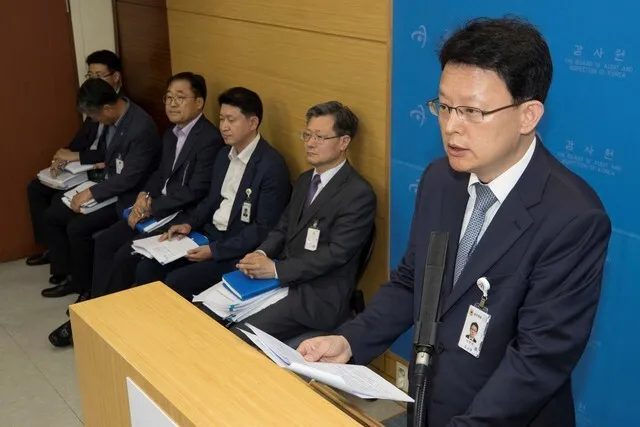hankyoreh
Links to other country sites 다른 나라 사이트 링크
BAI directly links Lee Myung-bak to Four Rivers Project disaster

The open secret of the Four Rivers Project has finally been confirmed. The dredging of the Nakdong River to a minimum depth of six meters and the construction of 16 massive weirs holding 800 million tons of waters on the four rivers without any plan for their use was ultimately ordered by former president Lee Myung-bak, according to an audit by South Korea’s Board of Audit and Inspection (BAI).
This is the first time that the BAI has directly mentioned Lee. When the BAI announced the results of its audit into the execution of major contracts, including design and overall bidding on the project to revive the four rivers, in July 2013, it only said that the decision to pursue the Four Rivers Project had been made “with a future canal in mind” and “in line with a request from the presidential office.”
According to the results of an assessment of the execution of the project to revive the four rivers and an analysis of its results that the BAI made public on July 4, the Four Rivers Project began after Lee instructed Jung Jong-hwan, then Minister of Land, Transport and Maritime Affairs, to move forward with a waterway renovation project. These instructions were given two months after Lee announced in June 2008 that he would give way to public opinion and halt a massive canal project.
After the Ministry of Land, Transport and Maritime Affairs briefed Lee on plans to prevent flooding by strengthening levies and dredging rivers, Lee instructed the Ministry to augment the plan with the construction of weirs and a plan created by the Korean Peninsula Great Canal Task Force during the presidential transitional committee, the BAI said.
When the Ministry reported in mid-February 2009 that a minimum depth of 2.5-3m was adequate for preventing flooding and dealing with water shortages, Lee personally ordered the depth to be increased to 4-5m, and a “presidential order” was also given in mid-April for the Nakdong River to be dredged to a minimum depth of 6m, the BAI said. In line with these directions, the final plan for the Four Rivers Project was announced in June without any technical analysis by the Ministry.

The BAI also concluded that “presidential instructions” were behind the Ministry of Land, Transport and Maritime Affairs’ decision to accelerate by one year its original plan to begin work in Jan. 2010 and finish in 2012 and the Ministry of Environment’s decision to shorten the period of time for the preliminary environmental review and the environmental impact assessment, which normally take between 5-10 months, to 2-3 months.
“Auditors sought to receive a direct explanation from Lee about why he gave such orders. However, they were unable to confirm the reasons or grounds for these orders because Lee did not consent to receiving a visit or a questionnaire,” the BAI said.
BAI says Lee cannot be held legally responsible for projectThe BAI’s position is that Lee cannot be held legally responsible because there are no grounds for concluding that Lee’s instructions were illegal.
“The president’s actions on the job cannot be subjected to a job audit, and no illegal activities by the president were discovered. It’s not possible to file charges against him for refusing to cooperate [with the audit],” said Namgung Gi-jeong, director of the BAI’s bureau for land and maritime affairs, during a briefing on July 4.
But regardless of whether Lee is held legally responsible, there are increasing calls for him to be held accountable on a political and moral level.
“The Four Rivers Project was a disaster in which the entire government – including the president; the Blue House; the Ministry of Land, Transport and Maritime Affairs; the Ministry of Environment; the Korea Water Resources Corporation, and the Ministry of Strategy and Finance – was dragooned into violating our nation’s land. Lee Myung-bak, who was the prime mover of the Four Rivers Project, should be immediately investigated and prosecuted according to the law, while the public servants who abused their authority or abetted his mistakes should be held accountable as well,” said the Citizens’ Committee for Restoring the Four Rivers to their Natural Condition in a statement released on Wednesday.
By Kim Jeong-su, senior staff writer, and Noh Ji-won, staff reporter
Please direct comments or questions to [english@hani.co.kr]

Editorial・opinion
![[Editorial] Asia Future Forum brings bright minds together to explore democracy’s future [Editorial] Asia Future Forum brings bright minds together to explore democracy’s future](https://flexible.img.hani.co.kr/flexible/normal/500/300/imgdb/original/2025/1024/1317612945603513.jpg) [Editorial] Asia Future Forum brings bright minds together to explore democracy’s future
[Editorial] Asia Future Forum brings bright minds together to explore democracy’s future![[Column] Russia and China’s golden ticket to destabilizing the dollar [Column] Russia and China’s golden ticket to destabilizing the dollar](https://flexible.img.hani.co.kr/flexible/normal/500/300/imgdb/original/2025/1023/2117612083961121.jpg) [Column] Russia and China’s golden ticket to destabilizing the dollar
[Column] Russia and China’s golden ticket to destabilizing the dollar- [Correspondent’s column] Martial law comes for the United States
- [Column] The end of the road for NewJeans, or a new beginning?
- [Editorial] Korea must prepare for rough road ahead with Japan
- [Editorial] Korea cannot afford to rush to a deal with the US
- [Column] Shared dilemmas at a historic turning point for Korea, Europe
- [Column] Halfway across the world, I’m cheering on Americans fighting for democracy
- [Column] How meritocracy turns into tyranny
- [Column] The real scandal of Korea’s ‘divorce of the century’
Most viewed articles
- 1Korea allows same-sex couples to check ‘spouse’ box on census for first time
- 2Record visitors bring National Museum of Korea into world top 5 art museum territory
- 3Real-life heroes of “A Taxi Driver” pass away without having reunited
- 4Lee says US tariff deal may not be finalized by next week’s APEC summit
- 5Despite stellar performance, BTS leaves Grammys empty-handed again
- 6North Korea asserts its presence before Trump arrives in South Korea
- 7Korea’s response to martial law crisis a model of 3 strategies for defending democracy, says Levitsk
- 8Korea, US will soon start negotiations on revising nuclear energy pact, says FM
- 9[Correspondent’s column] Martial law comes for the United States
- 10[Photo] Incheon Inner Harbor silo reborn as mural